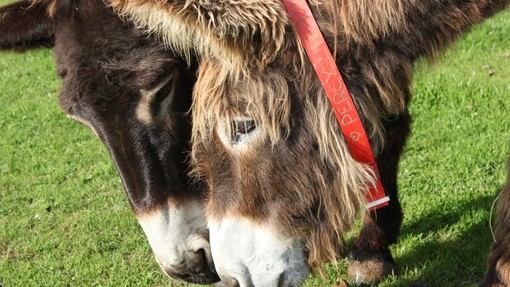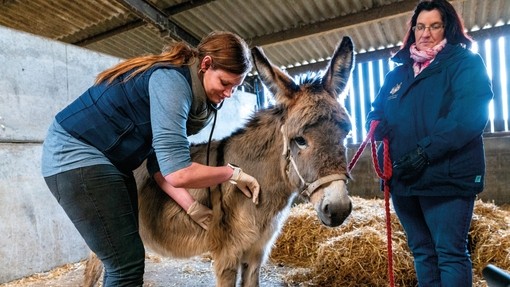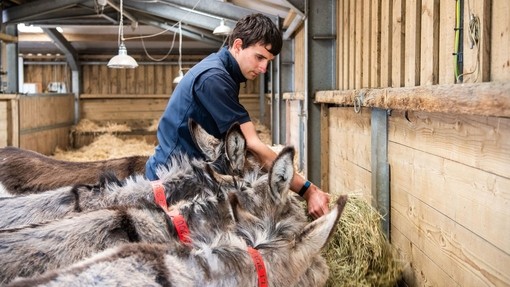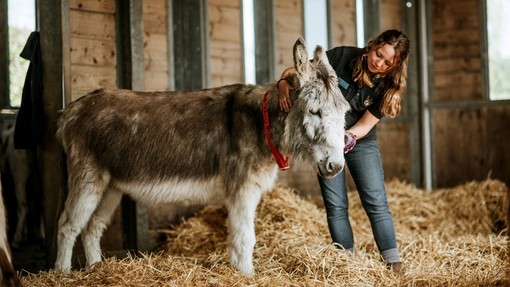What are the signs of respiratory disease?
Donkeys have a stoic nature, which means they often hide signs of illness until they are quite severe. Breathing should be as easy for donkeys as it is for people.
There are defence mechanisms in place to stop potentially harmful particles entering the lungs. These include:
- ‘mucus’ (nasal discharge) production to trap foreign particles
- coughing to expel these particles from the airways.
If you see coughing and mucus (nasal discharge) it is possible your donkey’s body is trying to fight off respiratory disease. However, donkeys have a particularly insensitive cough reflex, even when they have respiratory disease, so this tell-tale sign may be missing.
Being unable to tolerate exercise is a common sign of respiratory problems in horses, but is not a useful sign in donkeys. They tend to do less vigorous exercise and rarely become out of breath, so exercise will not highlight respiratory problems.
Signs of respiratory disease in your donkey will vary depending on the respiratory condition but may include:
- increased respiratory rate (breathing more rapidly)
- increased effort to breathe in or out, such as flared nostrils or contraction of abdominal (stomach) muscles
- outstretched neck
- coughing
- noisy breathing
- nasal discharge (thin, thick, white, yellow, green, or bright red)
- swellings under the lower jaw or in the throat area
- reduced appetite
- increased temperature
- dullness may be the only sign of illness.
Remember, a dull donkey is a veterinary emergency
How do I measure my donkey's respiratory rate?
Respiratory rate = the number of times your donkey breathes in and out in one minute.
In normal donkeys, respiratory rate ranges from 12 to 28 breaths per minute. The average is 20 breaths per minute.
Measure your donkey’s respiratory rate regularly so that you know what their normal range is. This will make it easier for you to spot changes that could indicate a problem. Pain or fear are other causes of an increase in your donkey’s respiratory rate. Foals naturally breathe faster than adults.
- check your watch or set a 15 second timer
- count each time your donkey breathes in and out during 15 seconds
- multiply that number by four to give you an answer in breaths per minute to find out your donkey’s respiratory rate.
Example: Your donkey takes five breaths in 15 seconds (in and out = one breath). Thus, their respiratory rate is 20 breaths per minute.
What should I do if my donkey shows signs of respiratory disease?
If you notice any signs of respiratory disease:
- separate your donkey from other equines until you know the cause. Keeping your donkey ‘in isolation’ is a precaution to stop other animals, or rarely humans, from becoming sick if the condition is contagious.
- keep your donkey with their bonded companion when isolating. The stress of separation can be very harmful to donkeys.
- contact your vet and arrange an examination.
- your vet will ask questions about your donkey to help decide what is wrong. This may include your donkey’s vaccination and worming history, and any changes to their diet or management. Tell your vet if your donkeys has had a similar problem in the past.
- Your vet will examine your donkey and may do tests if they feel it necessary. These may include a blood sample, a dung sample, or a swab sample from your donkey’s nostril.
- your vet may need to wait for test results before they can make a diagnosis and decide whether your donkey needs to stay in isolation.
- depending on what they think the problem is, your vet may need to do further tests to confirm a diagnosis.
An accurate diagnosis will help your donkey to receive the most effective treatment.
How should a donkey with respiratory disease be managed?
- Maintain high standards of hygiene, especially when your donkey is isolated, to prevent spread of infectious disease.
- Use disinfectants and wash your hands regularly.
- Wear dedicated clothing and use separate equipment if the cause of respiratory disease is infectious.
- Provide good nursing care and extra attention for sick donkeys.
If your donkey suffers from allergic disease, careful management is important to help reduce symptoms. Dust may trigger diseases like equine asthma. To reduce dust exposure:
- change to dust-free bedding.
- avoid feeding dusty forage.
- turn your donkey out as much as possible, while managing their weight.
How can I reduce my donkey’s risk of respiratory disease?
Keeping your donkey in good health makes it less likely they will suffer from respiratory disease.
- Vaccinate your donkey against equine flu. See factsheet Vaccinating your donkey for more information.
- Provide your donkey with effective worm (parasite) control. See factsheet on worm control for more information.
- Make sure that straw is good quality and as dust-free as possible. Check it for mould, if there are any signs the bale has spoiled, discard it. Do not feed mouldy or dusty straw to your donkey. The same applies for hay and haylage.
- Keep stables well-ventilated but protected from draughts.
- Clean and disinfect your donkey’s stable on a regular basis to remove dirty, damp bedding. See factsheet Donkey care calendar for more information.




